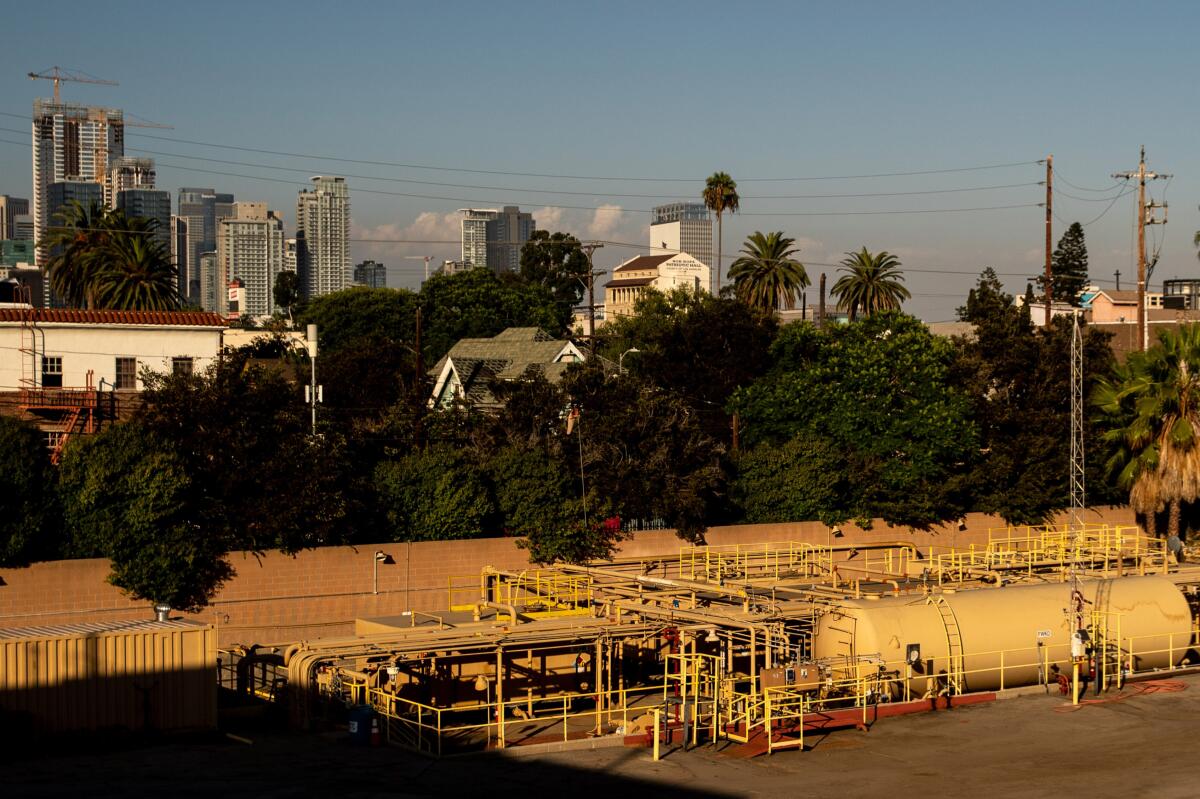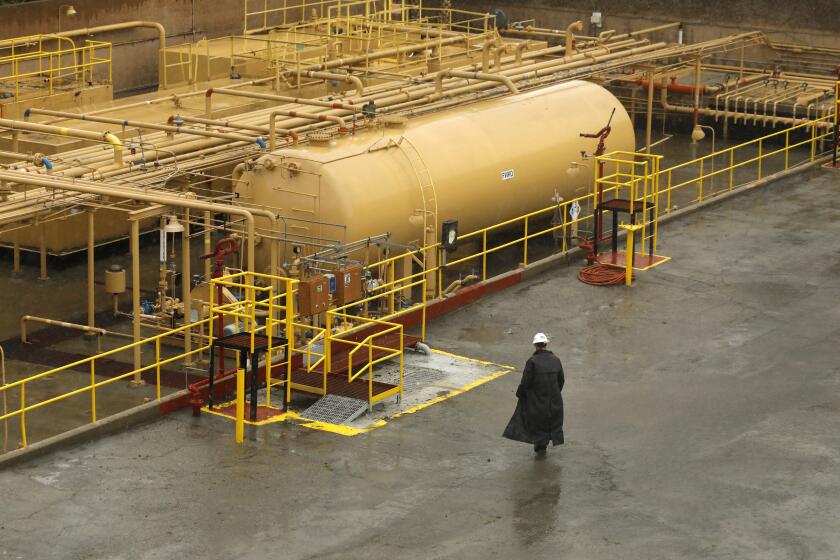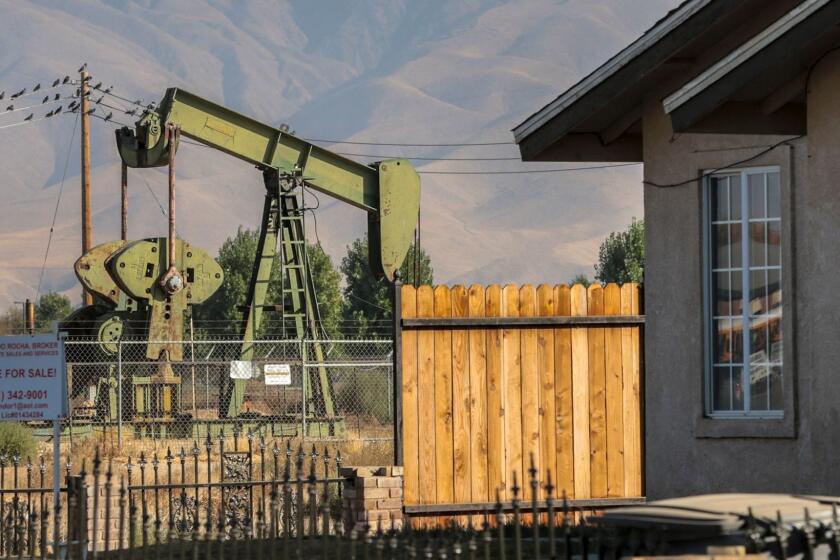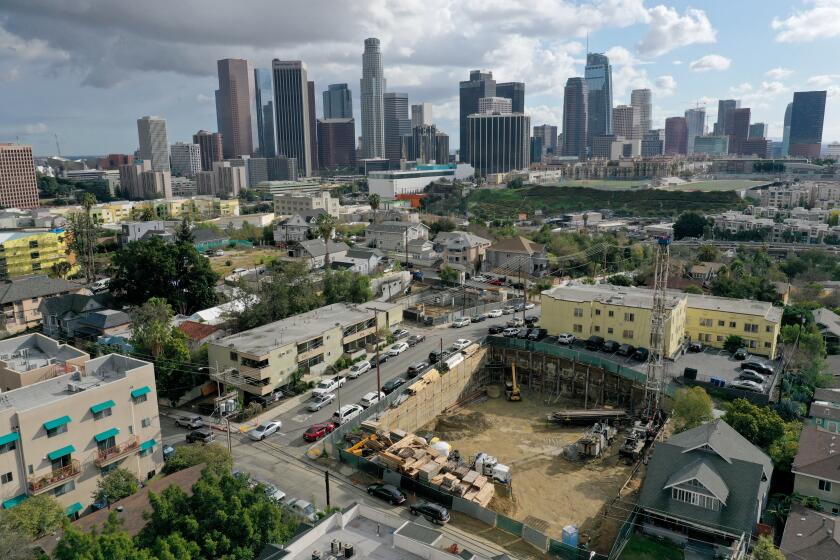California will cap hundreds of orphaned oil wells, some long suspected of causing illness

- Share via
California state regulators announced Tuesday their plans to cap orphaned oil wells across the state, including wells in a South Central Los Angeles residential neighborhood near USC that caused health complaints from residents for years.
The effort is part of a new push to close problem sites that have posed health risks to communities across the state, oftentimes disadvantaged neighborhoods in close proximity to oil drill sites. Gov. Gavin Newsom earmarked $100 million in the state budget to address the issue.
California has identified 5,300 wells that are orphaned, or likely orphaned, meaning they are deserted or do not have an operator who is financially viable or compliant, according to the California Geologic Energy Management Division.
Improperly abandoned wells can leak methane and harmful chemicals into groundwater. State regulators will target more than 370 wells in their first phase of the new push, which will cost about $80 million, according to CalGEM.
State regulators, unable to arrange a site inspection for months, showed up Monday with an inspection warrant and bolt-cutters.
“This list includes leaking wells with serious compliance issues that have concerned communities for years,” David Shabazian, director of the state Department of Conservation, said in a news release. “It represents months of work to collaborate with local governments, identify environmentally sensitive wells and those that impact disadvantaged communities across California’s oil-producing regions.”
Those sites include 37 wells with Citadel Exploration in Bakersfield; 22 wells with Sunray Petroleum near Arvin and Lamont in Kern County; and 21 wells in Los Angeles with AllenCo Energy.
The state’s announcement kicks off a 20-day public comment period for feedback about the program.
For years, neighbors living near the AllenCo drill site in South L.A. complained about noxious fumes that gave them nosebleeds, headaches and respiratory problems including asthma.
When federal inspectors from the U.S. Environmental Protection Agency became ill during a site visit in November 2013, AllenCo voluntarily shut down the facility.
“We’re very pleased that CalGEM is taking some action and is going to plug the wells,” said Hugo Garcia, campaign coordinator for environmental justice with South L.A.-based Esperanza Community Housing and coordinator of the “People Not Pozos” campaign, organizations that have been working to have the AllenCo wells addressed for years.
The word pozos means “oil wells” in Spanish.
“The community has been very stressed about this,” Garcia said, “and will be very happy to see that the wells will be plugged.”
But the announcement will not mean the end of Garcia’s campaign against the sites. He says now he’ll focus on making sure there’s follow-through.
“We need to continue meeting with CalGEM and ... support what they’re doing,” he said. “And, hopefully, it’s not going to get tied up.”
The wells and the facility, known as the St. James drill site, are owned by the Roman Catholic Archdiocese of Los Angeles. The troubled site was given to the church in the 1950s by the family of oil baron Edward Doheny. AllenCo took over operations at the site in 2009.
Hundreds of unplugged oil wells puncture the urban landscape of Los Angeles. But the city has been reluctant to use its full powers to ensure cleanup and protect the public.
As the operator of the site, AllenCo would ordinarily be responsible for plugging the wells, a spokesperson for the archdiocese said. The archdiocese was notified of the state’s plans to plug and properly abandon the drill site in accordance with California law, the spokesperson said.
“The Archdiocese had been in continued communication with the involved parties to seek a resolution that is in the best interest of the community and all other stakeholders,” church officials said in a statement. “We are pleased that CalGEM is exercising the power it has under California law to step in and perform the plugging, abandoning and decommissioning of the drillsite.”
A September 2019 report from CalGEM said inspectors had discovered a wellhead gas leak at the site. Six months later, regulators ordered AllenCo to permanently plug the site’s 21 wells, saying it had “deserted” the facility and was not properly maintaining the wells. But representatives for the company said it had not produced any oil on the site for a decade and would not be spending any “further capital” there. In August 2020, the Los Angeles city attorney’s office charged AllenCo with a criminal misdemeanor for not complying with the court order.
Officials say the inactive Allenco drilling site near USC continues to pose a potential risk to public health and safety.
A survey of idle wells by CalGEM shows the AllenCo site has been idle for at least seven years.
In March 2022, CalGEM served a search warrant of the site with California Highway Patrol officers and a locksmith who cut through the front gate’s locks after the operators refused to comply with the state agency’s requests for a site inspection. Under the court order, CalGEM entered the site to depressurize the wells to protect the community near USC.
In an ongoing civil lawsuit filed against the city of Los Angeles, AllenCo contends that the drill site is owned by the Archdiocese of Los Angeles and the city, and that it should not be liable for plugging the wells at the site. In court records, the city contends that it does not hold any extraordinary rights to control the wells and is not liable for safely sealing the site.
A spokesperson for the Los Angeles city attorney’s office declined to comment on CalGEM’s Tuesday announcement to seal AllenCo’s wells.
More to Read
Sign up for Essential California
The most important California stories and recommendations in your inbox every morning.
You may occasionally receive promotional content from the Los Angeles Times.
















